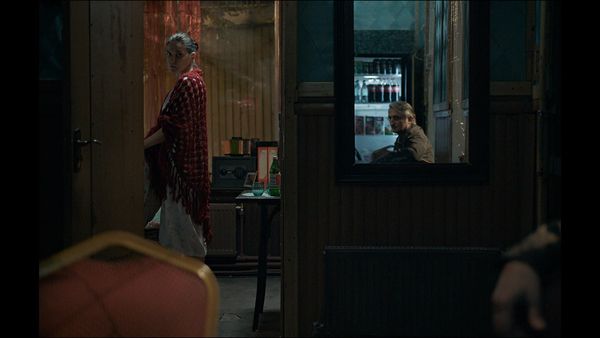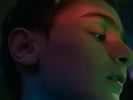Eye For Film >> Movies >> Runaway (2023) Film Review
Runaway
Reviewed by: Andrew Robertson

The eponymous runaway is himself unnamed. His escape is a slow one. As escapes go this one is catered, a room in a restaurant. That's not quite right. They've a stage, they've got music. They open late, stay open later. They've a room, and something owing. Something growing. The eponymous runaway is not the only one looking to escape.
A steaming glass of tea is lit by a torch, the amber chai from below the same orange as lamps through leaves. One of an ongoing array of startling shots, moments given strength by their composition. Tableux vivants given depth by mirrors. Boundaries and windows, net curtains, refrigerator doors. From the off, the camera fixed in the back seat of a vehicle. Perhaps one of those notionally off-road vehicles whose set and stance in some settings says "school run" and with just a hint of tint says "drug run".

Salome Kintsurashvili's eye is a keen one. Small details I recognise from my own long ago times in the licensed trade. The consolidation of left-cigarettes to pocket packet, the bussers' prerogative. The emptiness of a venue when the lights have come back up, every boundary brought close by dark and dancing made sterile and distant by day. Not the only void, nor the only stark contrast. Again and again framings that highlight borders, contrasts. Doors and clotheslines, shutters and shadows.
Small details in performance too. Ketino (Keti) concerned about what has been brought into her home, Ekaterina Perekrest often unseen in scenes obfuscated by kitchens and cleaning but no less impactful. Givi (Solomon Darsaniya) obligated by circumstance to harbour the runaway for "only two days," wearing that weariness in gesture and posture. Gvanca (Mariami Kantaria), their daughter, further into adulthood than brother Gigi. Sandro Baidarashvili's role is a strong one, the awkwardness of adolescence, look and glance and differing diffidence.
Anton Gromov's camera is sometimes fixed, in the back seat, in the back room, and at others prowling, lurching. Often close, claustrophobically so, even in exteriors hemmed in by laundry. Any film exploring criminal milieux with a handheld shot that tracks behind a protagonist will draw comparisons with Goodfellas. The glamour here is different, the spell cast in this short inflected by its setting of a Georgian family business in Russia. The film is a production of Moscow's School of New Cinema and from that comes a whole other set of complexities.
Maria Teryayeva's music is most strikingly used at the close, a reverberation to go with revelation. An earlier dance number is at once and is not diegetic, the music that we hear may not be the music that is playing but the sense of it is shared. A whirl of lights, motion and emotion. One might criticise a potential heavy-handedness but it earns its ending. The symbolism might be large enough to carry, but it's not unearned. As well to complain about a punchline. Incomplete resolution here is not a shock, even if the mantlepieces are mostly empty. A copy of One Flew Over The Cuckoo's Nest isn't there by accident but I can't quite place what's playing on the TV. There's still mystery, but the best kind. Means, motive, opportunity, quality.
Reviewed on: 22 Mar 2023














